The crater lake of Barombi Mbo was called “Elephant lake” at the time of the German colony, but the elephants were victims of the ivory trade. They are no longer around but it is still supposed to be a beautiful lake, just 3 kilometers out of Kumba, so I am heading there straight after getting up, before continuing cycling up north.

The road is tarred until the Kumba administrative buildings, then turns into a dirt track, and then it becomes a short nightmare. It is muddy and only motorbikers could possibly venture here.
There is another sign board detailing the risks associated with crater lakes, in particular the emission of a deadly gas, so doing anything too close is not advised. There is another lake in Cameroon, Lake Nyos, which I will visit later, that “killed” hundreds of villagers with poisonous gases. The risk is however very low and shouldn’t prevent anyone to witness the beauty of those crater lakes.
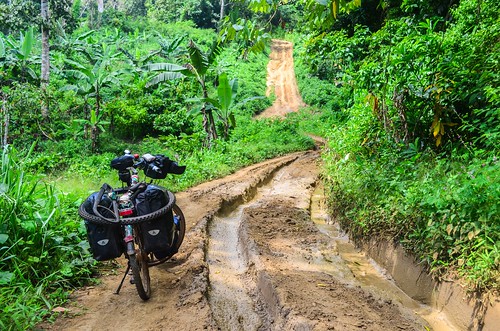
After pushing my bicycle for about 2 km on rough tracks, avoiding the mud pools (one foot of mine didn’t, and it went pretty deep), I finally reach the crater lake. I like those lakes, like the Lake Bosomtwe in Ghana. They are hard to reach, circular and nested in a crater, creating a little paradise. Lake Barombi Mbo is no exception to the rule and when I reach it, it is really quiet. We can’t hear any car.
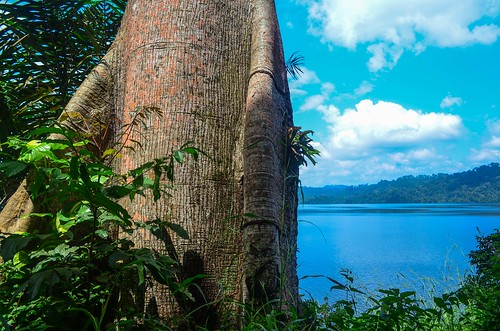

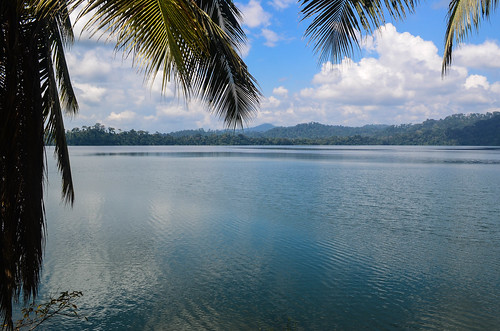
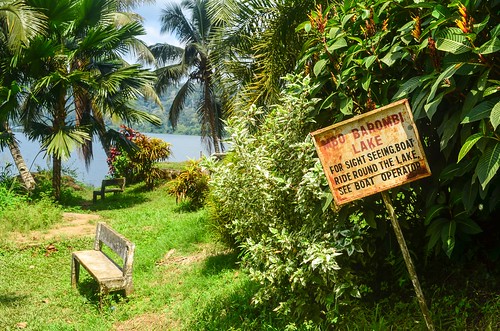
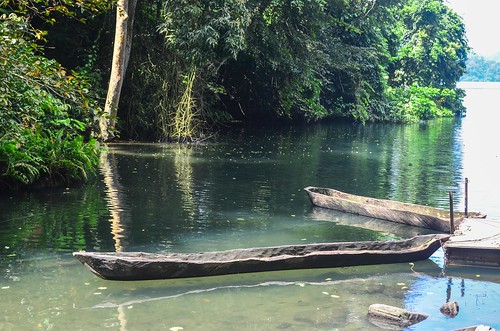
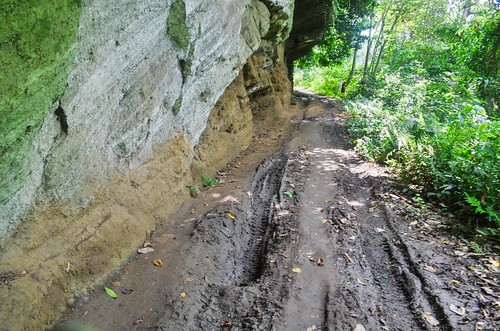

I spent much more time and sweat than expected on those few kilometers. Finally back on the tar road, my relief doesn’t last long: the road after Kumba quickly deteriorates. In order to reach Tombel, 50 km away, the locals pass through Douala, which is a 200 km detour. If this road is 4 times shorter in distance and isn’t used, it means it will be a big mess …
It starts with a smooth piste, a nice gravel surface through rubber plantations. It is very pleasant, but gets worse and worse.
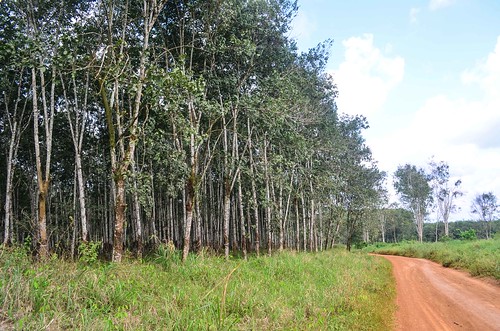
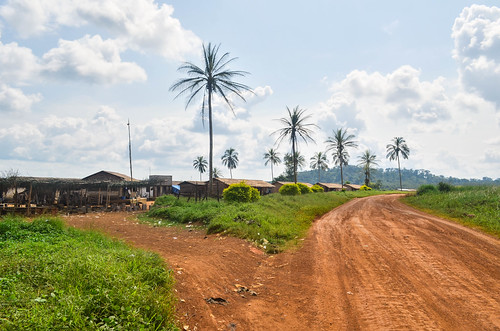
The gravel disappears for a hard laterite destroyed surface. It is a motorbiker-only road, and I see one 4×4 carrying 15 people struggling to pass. The passengers have to get down in the most difficult areas.
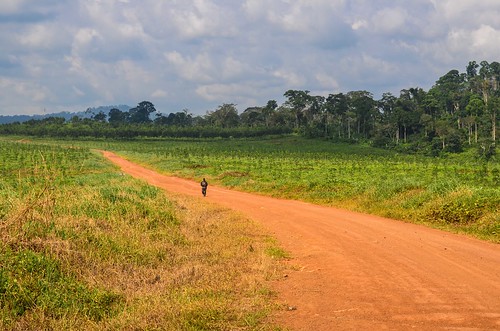
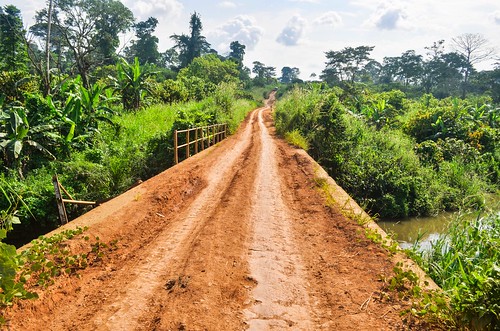

I am faster with my bicycle than the passengers of the 4×4. Whether they walk or they ride the vehicle, they have to go very slow on what looks more like a battle field than a road.
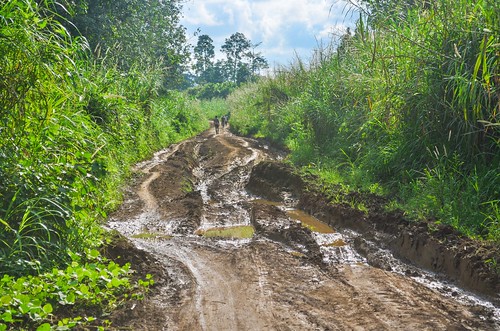
Faster than a vehicle doesn’t mean much faster than a pedestrian. Luckily I can push my two wheels around the mud pools, but it is still a pain and the hot sun is killing me from above.
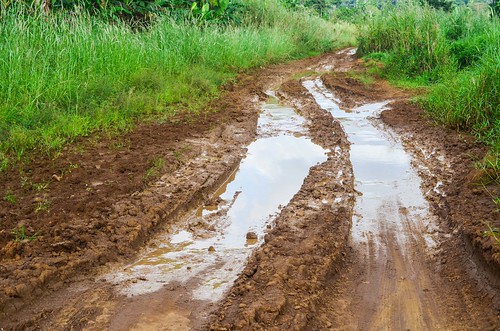
I thought the Guineas of West Africa offered the best “worst roads” of Africa, as since then the infrastructure quality kept improving, but it seems now that Central Africa is competing hard.

I manage to pass through the mud pools without stepping in the wrong place, but the road is so bad that the Bakossi people, living in the region of Tombel and Bangem, cannot get their harvest properly (before it rots) to the markets. I have seen so many farmers, old and young, pushing carts and trolleys with crops.
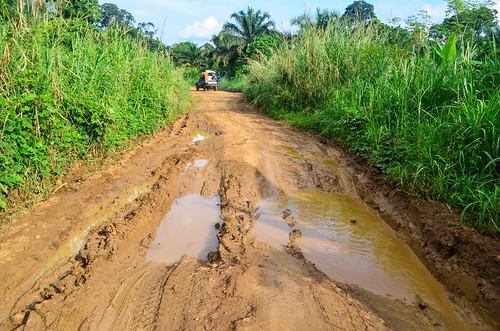
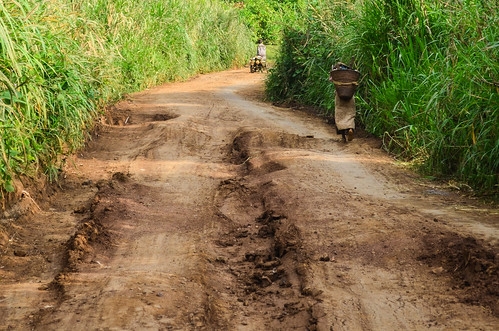
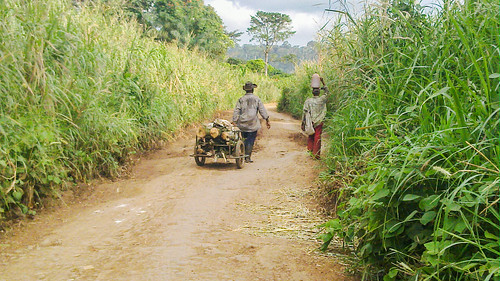
The kids keep calling me “White man!“, in English and not in any vernacular language, which is unusual. Maybe, with the presence of both English and French languages in Cameroon, there is no space for a strong vernacular language to become lingua franca, like Wolof in Senegal or Fon in Benin.
The road is tough but the worst is yet to come: it is not the water and the mud, but the stones: they cover the last 15 km to Tombel. The road is made of big stones, and I can absolutely not be riding in it. I spend my time pushing and fearing to break something.
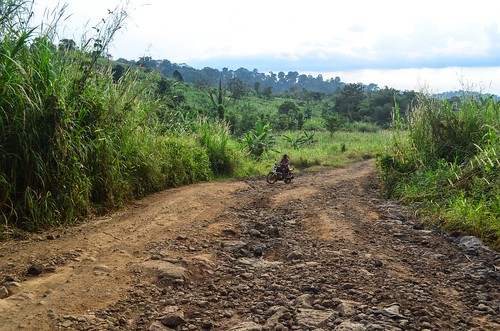
When I finally reach Tombel at dusk, my right pedal is making strange sounds. It is cracking. I figure out that the bearing is broken and the pedal comes off. Maybe it is old, or maybe it bumped too hard in the stones when pushing the bike earlier.
Tombel has no public lighting, few people outside and little street food. It is chill, standing against hills. It has a creepy atmosphere. The water pressure is too low to flow in the showers. This region of Cameroon seems completely abandoned. People complain that they lose too much of their crops because the trucks can’t pick them up, that there are no jobs, and transportation for both goods and people is impossible. I understand …
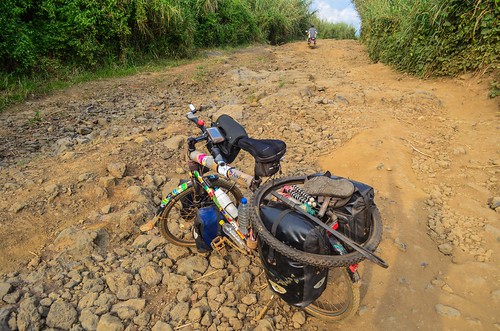
Pedals are kind of insignificant parts of the bicycle, but without pedals, even the best bike is useless. I am a bit down in this lonely town with a broken bike. My plan is to continue northbound to Bangem, but the locals, already impressed I came from the Kumba road, advise me strongly against taking this road, which is at least as bad as what I have seen. They say it would take 2 days to make 60 km. It is marked as a scenic one on the Michelin map, but feeling in pain for my bike, I sleep over the decision, and finally renounce to it to preserve my gear. Maybe it is already a miracle that I broke only a pedal and not a rack or a rim.
In the morning in Tombel, I visit all the bike shops and quincailleries of the small town, in order to find a spare pedal. I could also ride with the broken one, using only the axle as a support, as many local do on their wrecked bicycles. Luckily, I find the only shop that has bicycle parts: the man has a Indian pair of plastic pedals for 1500 CFA (2€). It won’t last long, but it’s better than nothing.
Renouncing to the scenic but painful Bangem road, I take the gravel piste to Loum, 7 km away, where the asphalt is back.
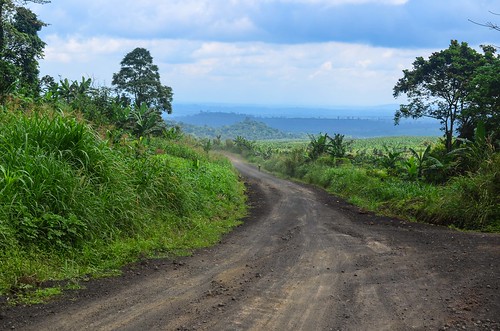
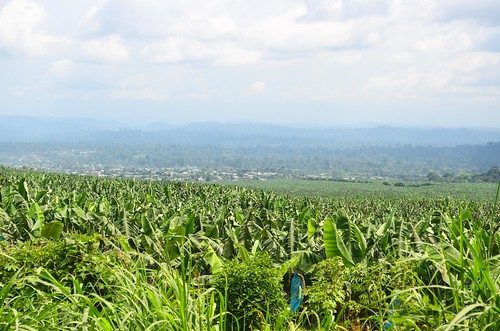
And suddenly, within 7 kilometers, people have stopped speaking English. I am in the francophone Cameroon now. “White man!” becomes now “hé le Blanc!“, but I am not called as much as before. Loum is in the Littoral province while Tombel was in the South-West. The regional division of the country seems to work perfectly also for the language division: there is no smooth transition where the francophones also speak English.
In Cameroon, it is no more the cellphone operators that announce the next city. It is the 33 Export beer that places a sign 33 kilometers before each city.
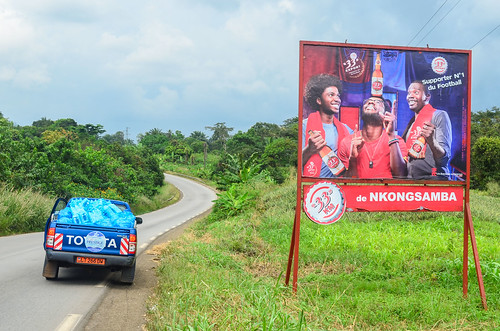
The rain pours soon after I quit Loum, and I have to shelter for an hour in the tiny toll booth. It was a good decision not to go to Bangem. With the worst roads ever, the rain, uphill with a plastic red pedal, it would have soon turned into a nightmare.
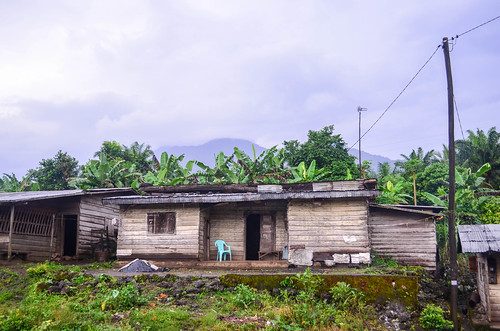
The road goes uphill again, up to 900 m high in Nkongsamba. It feels much colder. The fog deprives me of the scenery, and the hotel room has a blanket instead of a fan. There is cold water as usual, but at 900 m high, a cold shower is much colder.

I still witness many drunk men on the roads when I venture out for dinner. It is impressive how much people drink in Cameroon.
The misty morning doesn’t let me see further than a hundred meters. I continue on the road to the north, my objective being now to visit the North-West region of Bamenda, and the scenic “ring road”. The people I have met in Mount Cameroon told me this road, impassable during the rainy season, is dry, and even dusty. So I take up the challenge. It is a scenic 375 km ring of bad gravel roads in the mountains, at the border with Nigeria, about 400 km north of Yaoundé.
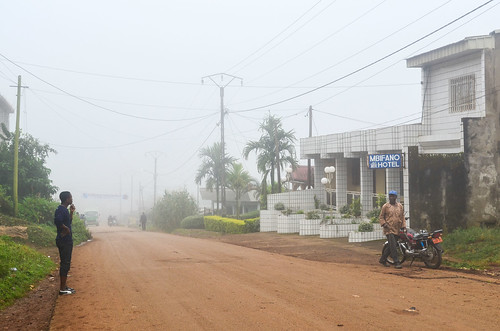
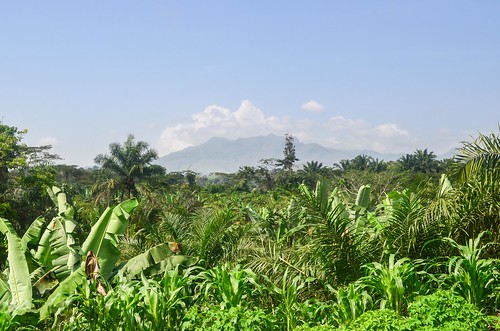
When I see the Ekom-Nkam waterfall sign on the right side of the road, one of the most impressive falls of the country, I hope it is worth the 2 x (9 km gravel road + 400 m elevation) round trip. The road is unpaved but not too bad. It looks however like if Cameroon likes to keep important roads and tourist roads in the poorest conditions.
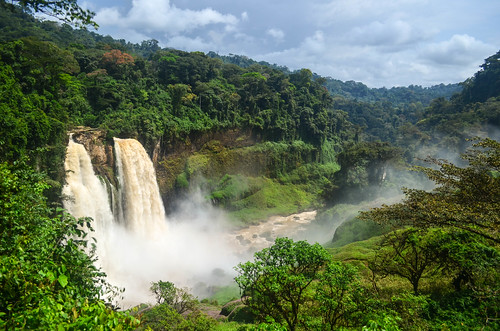
The falls are impressive and worth the round trip. The difference of temperature between 400 m at the bottom and 900 m on the main road is significant.
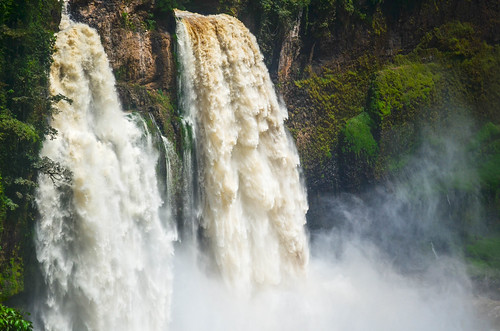
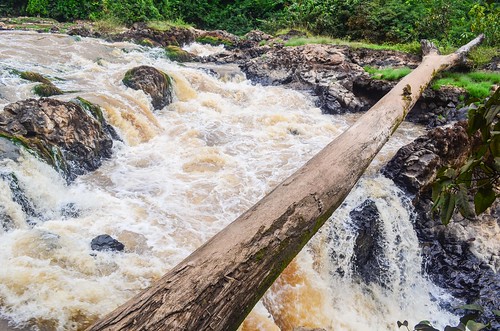
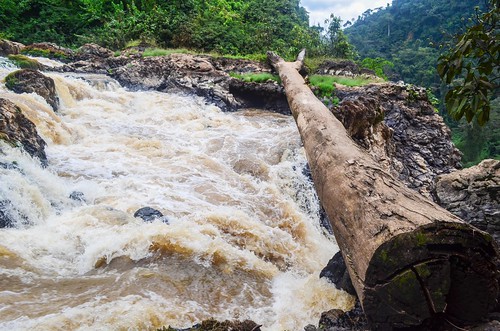
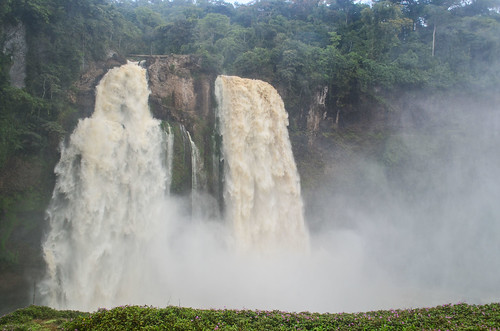
When I go up, pushing the bike for a third of the slope, under the sun, my forehead is dripping big drops of sweat. My efforts are rewarded by the locals of the top village, sitting in the shade, asking for a present. I don’t like being unwillingly Santa. The association “White man = free money” is so strong they don’t mind doing nothing, sipping their beers, and begging mechanically to the only one sweating out in the sun.
Once away from the tourist site, where people always have a distorted understanding of the Whites, I relax with groundnuts at the shop of a lady watching a Nigerian soap on TV. It is even dubbed in French for francophone Africa. It makes it even poorer and sounds like a dubbed version of The Young and the Restless.
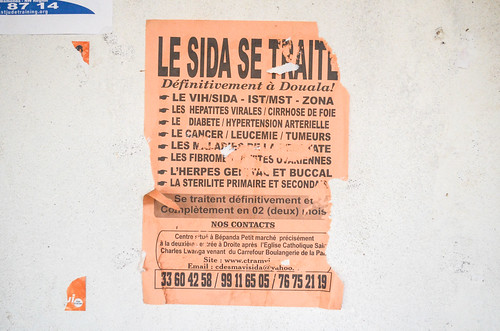
I have to shelter again in a bar in Melong while the rain pours. It happens every day in the afternoon, and it is far from being the dry season! Once again, a man in his fifties, looking rather wealthy, asks me randomly for a free beer, when his is still half full. What is the problem with Cameroonians? Drinking alcohol anytime of the day and asking for free beers to the only man who sweats. A beer of 650 mL costs 550 CFA, up to 1000 CFA for the Guinness bottle. It is roughly 1 €. When I read “in Africa, xx % of the population live with less than 1 € a day” in an article, I always wonder how this figures come out, as many of the not-so-rich looking ones are always drinking beers.
On the other hand, regardless of the actual poverty level, no one can deny that people look happier than in Europe. The bars and streets are always full of smiles. Even for a small bar of the countryside.
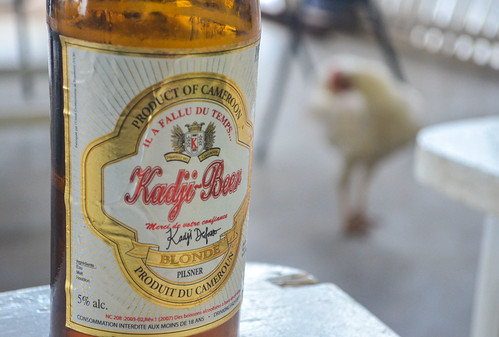
I end my day in Santchou, where I try my luck at another bike shop. My plastic pedal has been cracking the whole day, something in the bearing broke already. I can also hear a ball turning inside the plastic at each rotation of the crankset. It is already a mystery that this plastic pedal didn’t fall apart yet after 100 km.
Coming as a nice surprise, the small shop has steel pedals for 2000 CFA! They are ugly and too heavy, but it is not plastic. The weight in my hands gives me instant confidence. All the previous shops I had asked at replied that they have the plastic model, the same one, and that I can’t have a steel one. The steel ones used to be available in the past, but not anymore. For that, I would have to visit a welder and have them custom made. That is a reason to be angry against the Chinese, flooding the markets with plastic items, so cheap that everyone buys them, resulting in the extinction of reliable products.
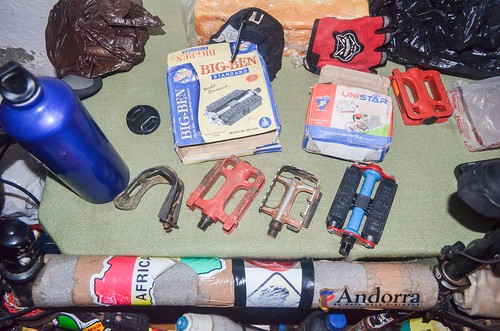
We often hear that Africa’s GDP grows by 5% every year and that African countries are rapidly developing. But the industrialization is pathetic. On the field, there are nothing more than ruins of factories of the colonial era, a few new factories operated by Chinese and Indians, and the beer (and soda) bottling factories. Yes, Africa is modern, urban people have smartphones, they dress like they can fit in New York and mobile internet is accessible everywhere, but in the facts, Africa is less industrialized then before.
During the boom of East Asian countries since 1980, the manufacturing’s share of their GDP rose from around 10% to more than 30% today. In Africa, it decreased from 12% to 10% in the recent years. In South Africa, Africa’s most industrialized nation, only 15% of the GDP is due to manufacturing. The governor of the Central Bank of Nigeria accused the Chinese as being partly responsible for the de-industrialization. The South African president Zuma said he is careful about the China-Africa partnership, which led to a trade in 2012 worth 20 times more than in 2000, making China the largest trade partner of Africa. If the continent keeps sending raw food crops and precious ore to China in exchange for cheap manufactured products and (cheap) Chinese expats, the history is just repeating itself. Seventy percent of the world’s cocoa is harvested in Africa, (predominantly in Ghana and Ivory Coast),yet, which countries produce chocolate? Nigeria is the world’s 6th largest producer of crude oil, yet, it has to import fuel. And the same goes on with coffee, cotton, nuts, etc.
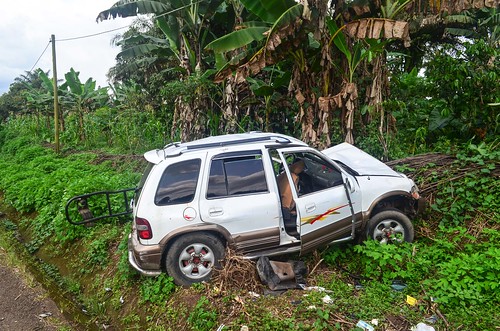
Of course, as a national of a western nation that used to colonize half of the continent, and is probably still doing via less apparent economic systems, my opinion can only be mocked. Western companies have behaved in the past worse than Chinese companies today. But everyone is praising China’s interest in Africa and their genuine help, without wondering why would China offer so much financing?
I was told once the problem comes from the Chinese companies, finding their local market too competitive, that are forced to work in Africa. In the world, they are the only ones, skilled enough, who can work for cheap enough and play with the rules of corruption. A Chinese expat building a road is very far from living like a Western expat in Africa.
Sure, China is bringing a lot of short-term happiness here, but they can’t be held as sole responsible of the apparent de-industrialization. As a Nigerian told me, so as to illustrate the local mentality and the lack of technical/industrial curiosity: “here, if a torch stops working, Africans will throw it away and get a new one. Other people would open it and investigate where the problem is, understanding how it works, how to to deal with it longer, maybe even make their own …”
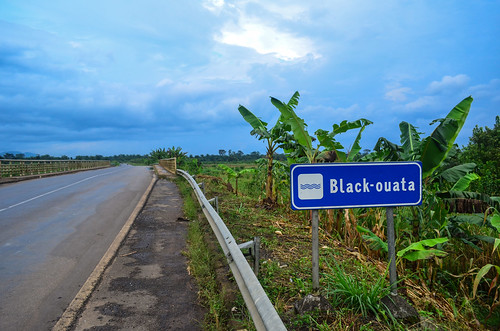
The example is gross, especially when you think of those cars and trucks that must have died a dozen times but keep being resuscitated in local workshops, but somehow funny. The Chinese torches and square lamps, fancy looking but as light as if they were hollow, are absolutely everywhere (unless the electricity works flawlessly). Most of them are about to stop working. They are the kind of Chinese plastic items you are not sure if it is already broken when you buy it.
It sure brings more comfort to life, very easily, just like the Chinese motorbikes available new for a couple of hundred USDs. They are Sanili, Meilun, Nanfang, etc, some don’t even have a website but the machines are everywhere. I wonder how people used to do before them, just like I sometimes wonder how did we do things before the Internet and how did we meet before cellphones. But as the owner of an old Yamaha, made in Japan and looking in a poor state, told me: “I never had to open the engine, the motorbike can still carry three people uphill“, and he would never trade it for a Nanfang or a Sanili. People know Chinese bring mostly crap, but it is too affordable and they have no competitors. Here, when you don’t have much money and see dual-SIM smartphones for under 50 €, obviously Chinese fakes that will stop working soon, you don’t think of gathering 200 € for a less-fancy original one.
As a result, people keep buying the cheapest items. Items of good quality disappear from the markets. Buying cheap and replacing as soon at it breaks becomes a habit. Products made in China have prices that can’t be beaten and are already everywhere on the continent, and they are the only ones people buy. Opening a factory in Africa sounds like a suicide mission.
The road in the valley of Santchou is bordered with cocoa plantations and storehouses. Every piece of land where the slopes are not too steep sees bananas and others crops farmed. My first challenge in the morning is to climb the slope to Dschang. It is not a baby slope: the road reaches a geographical dead end in the hills: it is steep everywhere around. The road climbs up along one of the mountains until … until above the clouds. It is more or less 10 kilometers at 10%, starting from 700 m of elevation and reaching the town of Dschang above 1500m. It goes even higher afterwards.
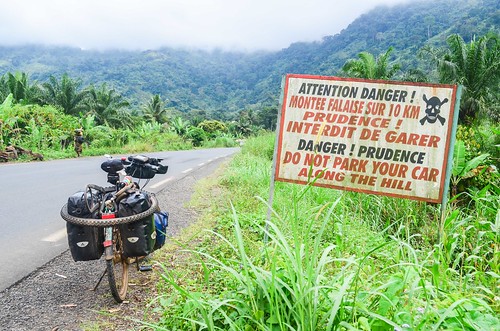
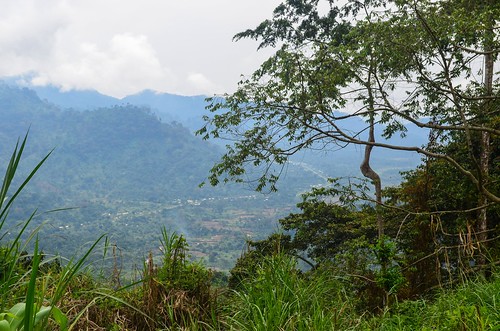
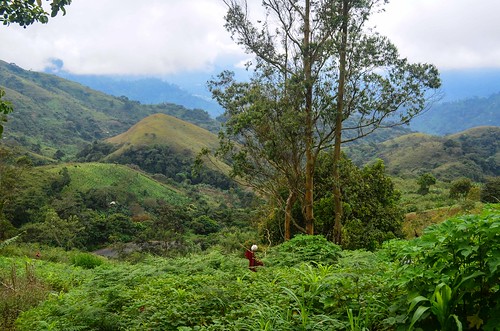
I push the bike for most of those ten kilometers. At the top, I am soaked from my own sweat and the cold wind makes me freeze. I cross Dschang quickly to go further to Mbouda, picking a gravel shortcut.
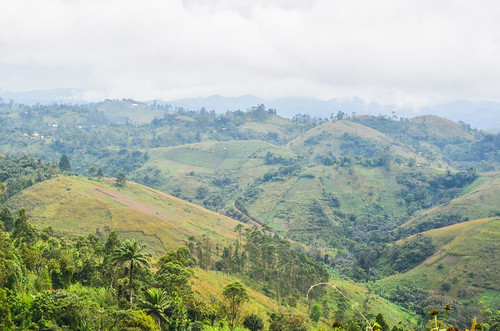
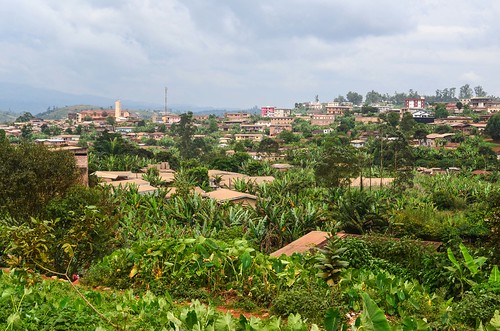
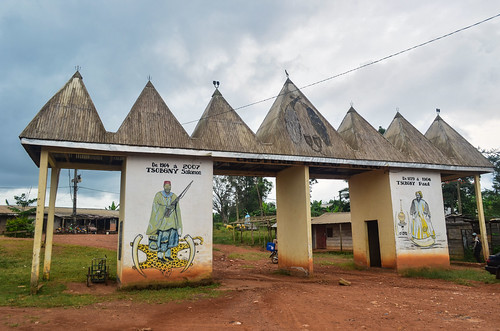
The unpaved road is not too bad, but I still have to push up to 1650 m. That makes a lot of elevation gain for the day. The clouds and the drizzle spoil the scenery. It becomes a routine to send beer-begging lazy people away. As almost everywhere else, there are no beggars, and everyone has enough food. But when people see me, they want something. During the few seconds it takes me to cycle past a group of men, I can hear sentences all synonyms of “Y’a quoi pour moi?“, “What did you bring me?“. The people are rather unfriendly. And I hear regularly requests for alcohol, like the “Donne moi mille francs je bois une bière” (“Give me 1000 francs so I drink a beer”) thrown at me while cycling. There is so much drinking here. From the cheap whiskey plastic sachet at 50 CFA to the 600 CFA beer bottle, everybody drinks. Women too. Maybe that is why they are not friendly. Besides that, the service is very poor: when I visit a shop or a hotel, the nonchalant person in charge always makes me feel that I disturb him/her right in the middle of doing nothing.
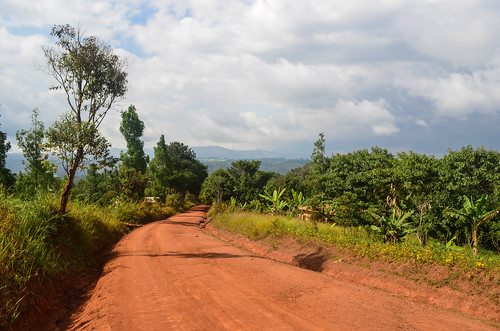
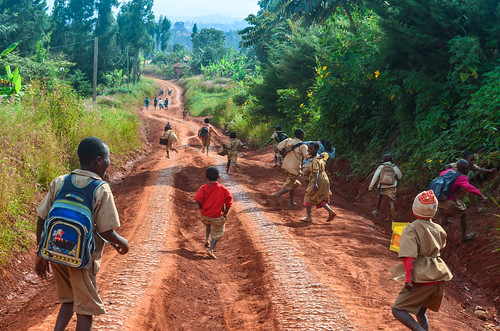
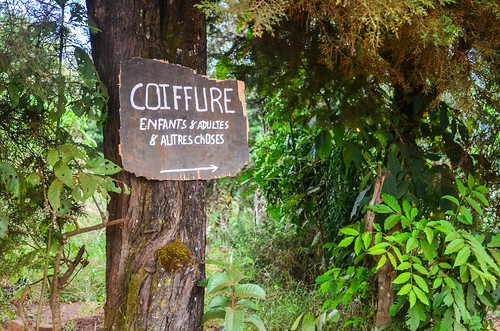
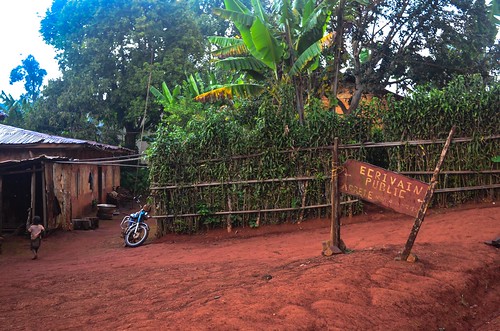
I reach Mbouda just before the proper evening rain and find a cheap hotel to spend the night. I am welcomed by teenagers asking whatever they think they can obtain from me. As I ask them questions, they make up lies to cover other lies, until their stories doesn’t make sense even for them. The gloomy town is poorly lit and I only go out to fetch food and bring it back. The mosque being just nearby, I know I will be awake at 5 am.
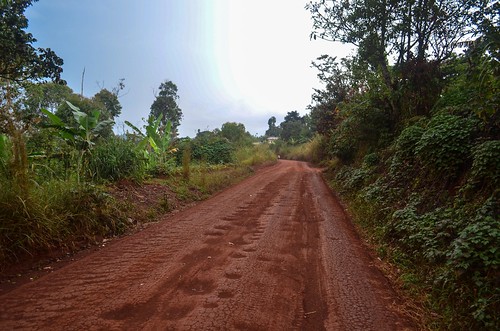
I gave away my plastic pair of pedals today, as I don’t need it anymore. It happens for some men in the hills to push an old rusty bicycle, used to carry food crops (although those men are rare compared to all the men doing nothing but drinking, and compared to the women working all day long in the fields). Often, their pedals are broken and they just ride with the pedal axle, so the plastic pair can be used until it breaks down to the axle.
Surprisingly, the first people I offered the box to refused. Until one said “I’d need to collect money first“, I hadn’t realized that I look just like an ambulant spare part seller. I have no money for fuel, I carry multiple pieces of luggage with a spare tire on top, and I go around asking “Do you need pedals?“.
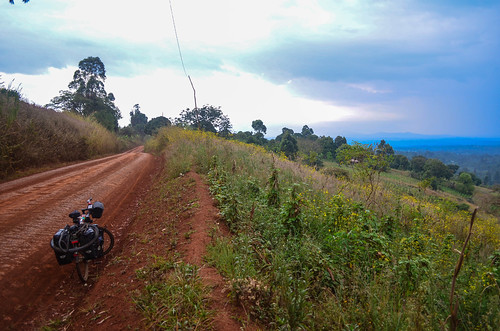







Hello I read all your commentaries, but I had once embarked in this your same type of journey. But still I will tell you that I wasn’t faced with all those troubles “begging of alcool”. I was instead welcomed by the chiefs and heads of different localities. Please dear friends reading this blog, next time you want to try this, don’t sleep in hotels, go to the chiefs, quarter heads, fons and present yourself when u reach a town. I made a tour round Cameroon and I visited all the towns and cities. You might say there is no time, but I invite you all to try it. Its a life experience, don’t miss it please. I love Cameroon.
Wow, I think you’re very brave for taking on my country on a bicycle. Your descriptions are so vivid and accurate I’ve been laughing as I read through because it tickles me that a foreigner sees my country exactly the same way I do. Bravo and goodluck on your travels.
Thanks for the marvelous pictures and pithy commentary. I both love and hate my country. Your blog reminded me why.
So that was your experience in cameroon hoh?nice visit sure it was something touristic rather because I didn’t hear you say anything about them,for sure you didn’t move along any goog road from your survey?nobody salute you?everybody ask for money?please cameroonians are proud people,even mad people don’t beg ok!we are happy people so stop exploiting our attitude and situations ok!
Thanks so much for sharing.
I have learnt a lot about my country from you blog.
Once more thanks and good luck in your travels
you only live once …”carpe diem”
you are amazing person…its forever in your memory..
I love learning from what you write in your blogs JB :-*